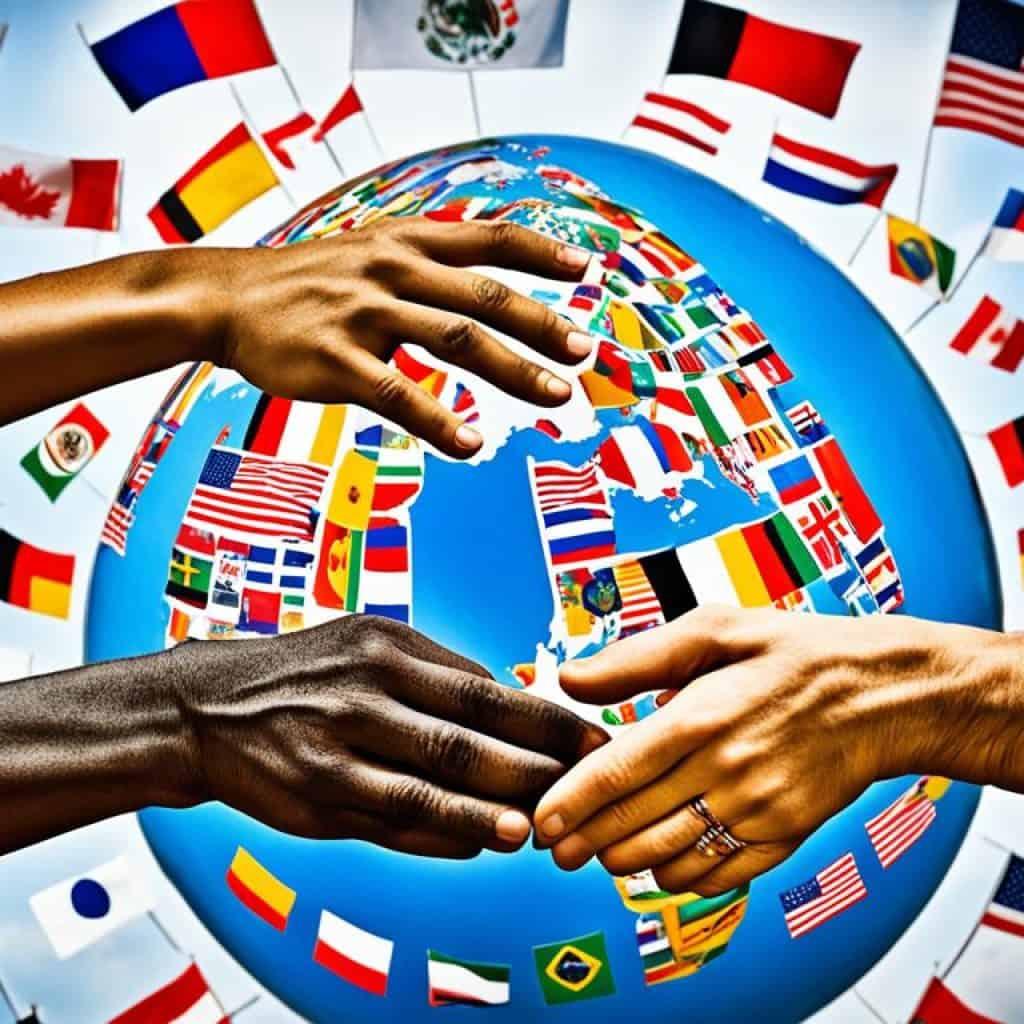Are you dreaming of marrying your foreign partner and starting a new life together in the United States? If so, the 90 Day Fiance Visa, also known as the K-1 Visa, may be the pathway to your happily ever after. But what are the requirements, processes, and timelines involved in obtaining this visa?
Join us as we unravel the complexities of the 90 Day Fiance Visa and provide you with a comprehensive guide to navigating the love and law that intertwine in the visa application process. From understanding the eligibility criteria and submitting the necessary documentation to preparing for the critical visa interview and exploring the potential challenges, we’ll equip you with the knowledge and insights you need to make this journey smoother.
Key Takeaways:
- Understanding the requirements and processes of the 90 Day Fiance Visa.
- Preparing for the visa interview and gathering supporting documentation.
- Learning how to navigate cultural barriers and conflicts in cross-cultural relationships.
- Recognizing the challenges and financial impact of the immigration process.
- Exploring the consequences of not marrying within the 90-day window.
The Importance of Communication in a Relationship
Effective communication is the cornerstone of a successful relationship, and it holds true for couples navigating the challenges of the 90 Day Fiance Visa process. Cultural and linguistic barriers often pose obstacles to understanding, making it crucial for couples to find effective ways to communicate and bridge the gap.
On the show, we witness couples utilizing various methods to overcome communication challenges. Some turn to translation apps or services provided by interpreters to facilitate conversations. Others prioritize learning each other’s languages to enhance understanding. These efforts demonstrate the significance of effective communication in building a strong foundation.
Open and honest communication is essential not only in romantic relationships but also in other aspects of life, including relationships with coworkers. It fosters trust, creates a safe space for vulnerability, and helps partners express their needs, desires, and concerns.
Navigating Cultural Barriers
Cultural differences can give rise to misunderstandings and conflicts in relationships. Couples on 90 Day Fiance often encounter challenges related to social norms, traditions, and customs. Navigating these barriers requires patience, empathy, and a willingness to embrace diversity.
By actively seeking to understand and appreciate each other’s cultural backgrounds, couples can develop a mutual respect and create a more inclusive environment. They can learn from one another and find common ground to build a harmonious partnership.
“In the end, it’s not just about understanding someone else’s culture; it’s about embracing it and celebrating it as a valuable addition to your own experience.” – David Coleman
Interpreters in Relationships
Interpreters play a crucial role in assisting couples during the Fiance Visa process. Their expertise in language and cultural nuances helps bridge communication gaps, ensuring that both parties can express themselves accurately and comprehend each other’s intentions.
Having an interpreter present during important conversations, interviews, or meetings with immigration officials can alleviate misunderstandings and facilitate effective communication. Their presence helps create a supportive and inclusive space for both partners to express themselves confidently, ensuring that their voices are heard and understood.
| Method | Description |
|---|---|
| Active Listening | Devoting full attention and responding to the speaker to enhance understanding. |
| Non-Verbal Communication | Understanding and interpreting body language, gestures, and facial expressions. |
| Clear and Concise Language | Using simple and understandable language to express thoughts and ideas. |
| Empathy | Putting oneself in the other person’s shoes to better understand their perspective. |
| Expressing Feelings | Openly sharing emotions, concerns, and needs to foster emotional connection. |
Building Respect in Cross-Cultural Relationships
Respect is a foundational element in all relationships, and it becomes even more critical in cross-cultural relationships. When individuals from different cultural backgrounds come together, there can be significant differences in social norms, traditions, and beliefs. Navigating these differences while maintaining respect is key to creating a harmonious and thriving partnership.
Couples featured on the popular TV show 90 Day Fiance often face challenges stemming from their cultural differences. These differences can manifest in various ways, such as disagreements over food, clothing choices, or family dynamics. However, rather than viewing these differences as roadblocks, successful couples understand the importance of respect and strive to understand one another’s perspectives.
By suspending judgment and approaching conflicts with open minds, couples can find common ground and reach mutually acceptable compromises. Respect involves actively listening to one another, genuinely seeking to understand cultural perspectives, and valuing the richness that diverse backgrounds bring to a relationship.
Understanding cultural norms is a crucial aspect of building respect. It requires empathizing with the experiences and values of one’s partner. This understanding allows couples to navigate conflicts more effectively and find more harmonious solutions.
“The beauty of cross-cultural relationships is the opportunity to learn and grow together. Embracing our differences while respecting one another’s customs allows us to build a foundation of love and understanding.” – Jessica Rodriguez, Relationship Coach
Embracing Cultural Differences
Embracing cultural differences means acknowledging that no culture is superior to another. It involves celebrating diverse traditions, customs, and ways of life. Couples can expand their horizons by participating in each other’s cultural events, trying new foods, and engaging in conversations that promote cultural understanding.
It’s crucial for both partners to approach cultural differences with curiosity and a genuine desire to learn. By asking questions and actively engaging, couples can deepen their understanding of each other’s backgrounds, fostering respect and appreciation.
Resolving Conflict in Cross-Cultural Relationships
Conflict is inevitable in any relationship, but it can be amplified in cross-cultural relationships due to varying communication styles and cultural norms. When conflicts arise, it’s important to approach them with empathy and respect.
Here are some strategies for navigating conflicts in cross-cultural relationships:
- Active listening: Take the time to listen actively and empathetically to your partner’s perspective before responding. This demonstrates respect and shows that you value their viewpoint.
- Seek clarification: If there is a misunderstanding due to cultural differences, ask questions to ensure you fully understand your partner’s intentions and beliefs.
- Find common ground: Look for shared values and beliefs that can serve as a foundation for resolving conflicts. Focus on what unites you rather than what divides you.
- Compromise: Be willing to find mutually beneficial solutions that honor both partners’ cultural backgrounds. This demonstrates respect for each other’s needs and fosters a sense of unity.
Remember, building and maintaining respect in a cross-cultural relationship requires ongoing effort and open communication. It’s a journey of growth and learning that can ultimately lead to a deeper connection and a stronger bond.

The Challenges of the Immigration Process
The show 90 Day Fiance sheds light on the challenges faced by couples going through the immigration process. Many of the couples experience financial strain due to the expenses associated with international travel, legal fees, and wedding planning. Additionally, the process can be lengthy and uncertain, with delays in work authorization for the newly arrived partner. The show highlights the realities of immigration and the impact it can have on individuals and their relationships.
Financial Impact of Immigration
Immigrating to a new country can put a significant strain on a couple’s finances. From international flights to legal representation and paperwork, the costs can quickly add up. Couples on 90 Day Fiance often find themselves navigating financial challenges as they try to meet the requirements of the immigration process. It is crucial for couples to budget and plan accordingly to ensure a smooth transition without unnecessary financial stress.
Work Authorization Delays
One of the biggest challenges couples face during the immigration process is the delay in work authorization for the newly arrived partner. This delay can impact their ability to support themselves financially and contribute to the household expenses. The show portrays the frustration and anxiety couples experience as they wait for the necessary documentation to be processed, highlighting the need for patience and resilience in overcoming these obstacles.
“The immigration process can be daunting, especially when it comes to the financial impact it has on couples. It’s important to plan ahead and understand the costs involved to avoid any unexpected financial burdens.” – Immigration Lawyer, Jane Smith
While the challenges of immigration can be overwhelming, couples on 90 Day Fiance show resilience and determination as they navigate the complexities of the process. Their stories serve as a reminder that love knows no borders and can overcome the obstacles that come with immigration.
Lessons from “90 Day Fiance” Couples
The couples on 90 Day Fiance teach us valuable lessons about love and relationships. Through their experiences, we gain insights into overcoming cultural barriers, navigating age differences, and the potential for fast-paced romances to lead to lasting marriages.
Overcoming Cultural Barriers
Lesson 1: Love knows no boundaries, and it can conquer even the most significant cultural differences. The couples on the show demonstrate that embracing each other’s backgrounds and traditions can strengthen their bond and create a harmonious relationship.
Age Differences in Relationships
Lesson 2: Age should never be a barrier to love. The show showcases couples with substantial age differences who prove that a connection can transcend age and lead to a successful and fulfilling relationship.
Fast-Paced Romances
Lesson 3: Love can flourish rapidly. The show features numerous fast-paced romances that defy conventional timelines. While some may be skeptical of whirlwind relationships, these couples showcase that genuine love can blossom quickly and result in a lifelong commitment.
“Love knows no boundaries, and it can conquer even the most significant cultural differences.”
These lessons from “90 Day Fiance” couples speak to the power of love and its ability to overcome obstacles. Whether it’s navigating cultural barriers, embracing age differences, or embracing the intensity of a fast-paced romance, these couples offer valuable insights into building strong and lasting relationships.

Understanding the Fiance Visa Process
Applying for a Fiance Visa involves a series of steps and requirements that couples must navigate. Here’s an overview of the Fiance Visa application process, along with the necessary requirements and the timeline to expect.
- Filing the Petition: The process begins with the U.S. citizen filing a petition (Form I-129F) on behalf of their foreign fiance with the United States Citizenship and Immigration Services (USCIS).
- USCIS Review: The petition is then reviewed by the USCIS to determine the eligibility of the couple and assess the authenticity of their relationship.
- Transfer to U.S. Embassy or Consulate: If the petition is approved, the case is transferred to a U.S. Embassy or Consulate in the foreign fiance’s home country for further processing.
- Interview and Medical Examination: The foreign fiance will be required to attend an interview at the U.S. Embassy or Consulate, where they will undergo a medical examination to ensure their eligibility for the Fiance Visa.
- Intent to Marry: The couple must demonstrate their intent to marry within 90 days of the foreign partner’s arrival in the United States.
- Visa Issuance: If all requirements are met and the visa is approved, the foreign fiance will receive their Fiance Visa, allowing them to travel to the United States.
The Fiance Visa process can take several months to complete, depending on various factors such as the workload of the USCIS and the U.S. Embassy or Consulate. It is essential to familiarize yourself with the Fiance Visa requirements and adhere to the timeline to ensure a smooth process.
| Fiance Visa Process | Timeline |
|---|---|
| Filing the Petition (Form I-129F) | Approximately 3-5 months |
| USCIS Review | Varies |
| Transfer to U.S. Embassy or Consulate | Varies |
| Interview and Medical Examination | Varies |
| Visa Issuance | Varies |
It is important to note that there are fees associated with the Fiance Visa application, including the filing fee and the medical examination fee. Consulting with an experienced immigration lawyer can provide valuable guidance throughout the Fiance Visa process and help ensure a successful outcome.
Qualifying for a Fiance Visa
To successfully apply for a Fiance Visa, there are several key eligibility requirements that both the U.S. citizen petitioner and the foreign fiance must meet. These requirements include U.S. citizenship, intention to marry, and the demonstration of a genuine relationship. Let’s explore these qualifications in detail:
U.S. Citizenship Requirement
To petition for a Fiance Visa, the petitioner must be a U.S. citizen. Permanent residents (green card holders) are not eligible to file for a Fiance Visa. It is essential to establish U.S. citizenship by providing supporting documentation, such as a valid U.S. passport or a certificate of naturalization.
Fiance Visa Relationship Authenticity
Proving the authenticity of the relationship is a critical aspect of the Fiance Visa application process. The couple needs to demonstrate that their relationship is genuine and not solely for the purpose of obtaining an immigration benefit. USCIS officers carefully examine the evidence provided to determine the authenticity of the relationship. This evidence may include:
- Proof of shared financial responsibilities, such as joint bank accounts or ownership of property
- Documentation of joint activities, such as travel itineraries or photos together
- Affidavits from friends and family attesting to the legitimacy of the relationship
Foreign Fiance Eligibility
The foreign fiance must also meet certain eligibility criteria to qualify for a Fiance Visa. They must be legally able to marry both according to the laws of their home country and the United States. Additionally, they must have a clean criminal record and be admissible to the United States. Any criminal history or past immigration violations could impact their eligibility.
Eligibility Summary
To summarize, for a successful Fiance Visa application, the petitioner must be a U.S. citizen, intending to marry their foreign fiance. Both partners must prove the authenticity of their relationship, and the foreign fiance must meet legal eligibility requirements. Meeting these criteria is crucial for a successful Fiance Visa application and the start of a life together in the United States.
Fiance Visa Eligibility Requirements
| Requirement | Description |
|---|---|
| U.S. Citizenship | The petitioner must be a U.S. citizen. |
| Intention to Marry | The couple must plan to marry within 90 days of the foreign fiance’s arrival in the U.S. |
| Relationship Authenticity | The couple must provide evidence demonstrating the authenticity of their relationship. |
| Foreign Fiance Eligibility | The foreign fiance must be legally eligible to marry and have no criminal record or immigration violations. |
Ineligibility for a Fiance Visa
In order to obtain a Fiance Visa, it is important to understand the factors that may render individuals ineligible for this visa category. This section will explore some common reasons for ineligibility, including criminal history, health-related issues, and past immigration violations.
Criminal History
A history of criminal activities can significantly impact an individual’s eligibility for a Fiance Visa. In general, individuals with a criminal record may be deemed inadmissible to the United States, especially if their offenses involve crimes of moral turpitude or pose a threat to national security. It is crucial to consult with a knowledgeable Fiance Visa lawyer to assess the impact of criminal history on your specific case and explore potential legal solutions.
Health-Related Issues
Health-related issues can also affect eligibility for a Fiance Visa. Certain medical conditions or communicable diseases may result in ineligibility or require additional medical screenings. It is important to undergo the required medical examination as part of the Fiance Visa application process to determine any potential health-related concerns and address them accordingly.
Past Immigration Violations
Past immigration violations, such as overstaying a previous visa or engaging in unauthorized employment, can impact an individual’s eligibility for a Fiance Visa. These violations may raise concerns about an individual’s compliance with immigration laws and adherence to visa restrictions. Consulting with a Fiance Visa lawyer can help you navigate any past immigration violations and explore strategies to overcome these obstacles.
“Understanding the potential ineligibility factors for a Fiance Visa is crucial for a successful application. Working with an experienced Fiance Visa lawyer can help address any concerns and guide you through the process, ensuring the best possible outcome.”
Consulting with a knowledgeable Fiance Visa lawyer is essential to address any potential concerns related to criminal history, health-related issues, or past immigration violations. They can provide personalized guidance and explore legal solutions to help you overcome these obstacles and maximize your chances of obtaining a Fiance Visa.
| Ineligibility Factors | Description |
|---|---|
| Criminal History | History of criminal activities, crimes of moral turpitude, or threat to national security. |
| Health-Related Issues | Medical conditions or communicable diseases that may pose a risk. |
| Past Immigration Violations | Previous violations such as overstaying a visa or unauthorized employment. |
Navigating the Fiance Visa Application Process
When applying for a Fiance Visa, attention to detail and thorough documentation are essential. Providing evidence of a genuine relationship strengthens your application’s credibility and increases your chances of a successful outcome. Working with an experienced immigration lawyer can provide invaluable guidance throughout the process.
Evidence of a Genuine Relationship
It is crucial to gather supporting documentation that demonstrates the authenticity of your relationship. This evidence can include:
- Plane tickets or travel itineraries showing visits to each other
- Photographs together showcasing milestones and special moments
- Social media posts and messages documenting your shared experiences
- Correspondence such as letters, emails, or text messages expressing your love and commitment
Presenting a comprehensive collection of evidence reinforces the validity of your relationship, helping immigration officials assess the genuineness.
Working with an Immigration Lawyer
While not required, partnering with an experienced immigration lawyer can significantly ease the complexity of the Fiance Visa application process. A knowledgeable lawyer can:
- Provide expert advice on gathering the necessary documentation
- Ensure all forms and paperwork are completed accurately and submitted on time
- Offer guidance on interview preparation to increase your confidence and chances of success
- Advocate for your rights and navigate any potential challenges that may arise
By working with an immigration lawyer, you can alleviate stress and increase the efficiency of your Fiance Visa application process, allowing you to focus on your relationship.
“Partnering with an immigration lawyer gives you peace of mind, knowing that your application is in capable hands. They have the expertise and experience to guide you through every step of the process.” – Rebecca Davis, Immigration Attorney
The Fiance Visa application process may seem daunting, but with the right documentation and professional support, you can navigate it successfully. Remember, every relationship is unique, and every application requires personalized attention. By preparing thoroughly and working with an immigration lawyer, you can increase the likelihood of a positive outcome.
Post-Issuance Procedures
Once the Fiance Visa is issued, the foreign fiance can finally travel to the United States to begin their new life together with their partner. The journey towards building a future as a married couple continues with the 90-day marriage window.
During this 90-day period, the couple must solemnize their union in matrimony. It is an important step in the Fiance Visa process and must be completed within the allotted timeframe. This brief period serves as an opportunity for the couple to solidify their commitment and establish a strong foundation for their future together.
After the couple is married, the foreign spouse can initiate the next step in the immigration process – the adjustment of status. This crucial step enables the foreign spouse to apply for lawful permanent resident status, also known as a green card. Obtaining a green card provides the foreign spouse with the ability to live and work in the United States on a permanent basis.
Navigating the Adjustment of Status Process
The adjustment of status process involves submitting an application to the United States Citizenship and Immigration Services (USCIS). This application requires various supporting documents to prove the authenticity of the marital relationship. The documentation may include:
- Marriage certificate
- Joint financial records
- Lease or mortgage agreements
- Utility bills addressed to both spouses
- Photographs of the couple together
Applying for adjustment of status can be a complex procedure, and it is advisable to seek the guidance of an experienced immigration attorney to ensure that all necessary documents are prepared accurately and submitted in a timely manner.

Adjustment of Status Timeline
The timeline for the adjustment of status process can vary depending on various factors, such as USCIS processing times and the complexity of the case. On average, it may take several months for the USCIS to adjudicate the application and issue a decision. The exact timeline can be difficult to predict, but it is vital for the couple to remain patient and prepared throughout the process.
During this time, the foreign spouse may be eligible to apply for an Employment Authorization Document (EAD) to work legally in the United States while the adjustment of status application is pending.
Overview of Adjustment of Status Process
| Step | Description |
|---|---|
| 1 | Submit adjustment of status application to USCIS |
| 2 | Complete biometric appointment (fingerprinting, photograph, and signature) |
| 3 | Attend an interview with USCIS (if required) |
| 4 | Await USCIS decision |
| 5 | Receive lawful permanent resident status (green card) upon approval |
Obtaining lawful permanent resident status is a significant milestone in the Fiance Visa process and paves the way for the couple to build a more permanent life together in the United States. It grants the foreign spouse the right to live and work in the country and opens doors to various social and economic opportunities.
“Adjustment of status marks the beginning of a new chapter in the couple’s lives, where they can fully embrace the rights and privileges that come with permanent residency in the United States.” – Immigration Attorney
Duration and Cost of the Fiance Visa Process
Obtaining a Fiance Visa involves both time and financial considerations. Understanding the processing time and budgeting for the associated expenses are crucial steps in planning for a successful Fiance Visa application.
The processing time for a Fiance Visa can vary depending on several factors. On average, it takes between 6 to 9 months from the initial petition to the final decision. It’s important to note that this timeframe can fluctuate due to individual circumstances, USCIS workload, and other external factors.
The processing time for a Fiance Visa can vary, with an average timeline of 6 to 9 months.
In addition to the processing time, couples should consider the costs associated with the Fiance Visa process. These costs can include filing fees, medical examination fees, translation fees, and miscellaneous expenses related to document preparation and travel arrangements.
Creating a budget specifically allocated for Fiance Visa expenses is essential. Consulting with an experienced Fiance Visa lawyer can provide couples with a detailed breakdown of expected costs, ensuring accurate planning and financial preparedness.
Here is a detailed table illustrating the potential costs involved in the Fiance Visa process:
| Expense | Cost |
|---|---|
| Filing Fees | $535 |
| Medical Examination | $200 – $500 |
| Translation Services | $50 – $150 (per document) |
| Miscellaneous Expenses | Varies |
It’s important to note that these costs are subject to change. Consulting with a Fiance Visa lawyer will provide couples with the most accurate and up-to-date information regarding expenses.
Legal Consequences of Not Getting Married
When pursuing a Fiance Visa, it is crucial to understand the importance of marrying within the 90-day window after your foreign fiance’s arrival in the U.S. Failure to do so can lead to severe legal consequences, potentially resulting in the departure of your partner from the country.
Marrying within the designated timeframe is not only a requirement but also a way to avoid complications in the Fiance Visa process. By adhering to this timeline, you ensure a smoother and more efficient visa application. It demonstrates your commitment to the process and your genuine intention to build a life together as a married couple in the United States.
Consequences of not marrying within 90 days can include:
- The need for your foreign fiance to leave the country: If the 90-day period elapses without the marriage taking place, your partner may be required to return to their home country. This separation can be emotionally difficult and result in significant disruption to your plans and dreams for the future.
- Complications in the Fiance Visa process: Failure to comply with the marriage requirement can complicate the Fiance Visa process, potentially leading to delays, additional documentation requests, or even denial of the visa application. These complications can cause further stress, uncertainty, and financial burden.
To avoid these consequences, it is essential to plan and prepare for your wedding within the designated timeframe. Remember that getting married is not only a legal requirement but also an opportunity to celebrate your love and commitment.
“Marriage is a legal bond that solidifies your love and protects your future together. Don’t let the 90 days slip away.”
Conclusion
Navigating the Fiance Visa process can be complex and overwhelming, but with the support of knowledgeable professionals like those at Gonzalez Legal, couples can unite their families and build a future together. Our dedicated team understands the intricacies and requirements of the Fiance Visa application process, providing guidance and expertise every step of the way.
Love knows no borders, and the Fiance Visa serves as a testament to the power of love and commitment. It allows couples from different nations to overcome obstacles and create a life together in the United States. At Gonzalez Legal, we believe in the strength of love and the importance of family, and we are here to help couples successfully navigate the Fiance Visa process.
Whether you are planning to apply for a Fiance Visa or have encountered challenges in the process, our experienced attorneys are ready to assist you. We are committed to providing personalized attention, thorough preparation, and reliable guidance to ensure a smooth and successful Fiance Visa journey. Contact Gonzalez Legal today to take the next step towards building the future you and your partner deserve.
FAQ
What is a 90 Day Fiance Visa?
A 90 Day Fiance Visa, also known as a K-1 Visa, is a non-immigrant visa that allows foreign individuals to come to the United States to marry a U.S. citizen and start a life together. The couple must get married within 90 days of the foreign partner’s arrival in the U.S.
Why is communication important in a relationship?
Communication is essential for a successful relationship as it allows couples to understand each other’s needs, resolve conflicts, and build trust. It is especially crucial in cross-cultural relationships where cultural and language barriers may exist.
How can cross-cultural relationships build respect?
Cross-cultural relationships can build respect by embracing and understanding each other’s social norms and beliefs. By suspending judgment and striving to understand the other’s perspective, conflicts can be navigated more effectively, and compromises can be reached.
What challenges do couples face in the immigration process?
Couples going through the immigration process often face financial strain due to expenses such as travel, legal fees, and wedding planning. The process can also be lengthy and uncertain, with delays in work authorization for the foreign partner.
What lessons can be learned from “90 Day Fiance” couples?
“90 Day Fiance” couples teach us that love can overcome cultural barriers and that significant age differences do not necessarily hinder a successful relationship. They also show that fast-paced romances can still lead to lasting marriages if a genuine relationship is demonstrated.
What is the Fiance Visa process?
The Fiance Visa process begins with a U.S. citizen filing a petition on behalf of their foreign fiance. The petition is reviewed by the United States Citizenship and Immigration Services (USCIS) and if approved, it is transferred to a U.S. Embassy or Consulate in the foreign fiance’s home country for processing.
What are the requirements for a Fiance Visa?
To qualify for a Fiance Visa, the U.S. citizen petitioner must be a U.S. citizen, intending to marry their foreign fiance, and demonstrate the authenticity of their relationship. The foreign fiance must be legally eligible to marry and have a clean criminal record.
Are there any reasons for ineligibility for a Fiance Visa?
Yes, certain factors such as a history of criminal activities, health-related issues, or past immigration violations can render individuals ineligible for a Fiance Visa. Consulting with an immigration lawyer can help address any concerns and explore legal solutions.
How can couples navigate the Fiance Visa application process?
Navigating the Fiance Visa application process requires attention to detail and the gathering of supporting documentation. This can include evidence of a genuine relationship, such as plane tickets, photos, and correspondence. Working with an immigration lawyer can ensure that all necessary documentation is prepared accurately and submitted on time.
What are the post-issuance procedures for a Fiance Visa?
After a Fiance Visa is issued, the foreign fiance can travel to the United States, and the couple has 90 days to get married. Once married, the foreign spouse can apply for an adjustment of status to seek lawful permanent resident status in the U.S.
How long does the Fiance Visa process take and what are the costs involved?
The Fiance Visa process can take 6 to 9 months on average. Couples should budget for the costs associated with the process, including filing fees, medical examination fees, and miscellaneous expenses. Consulting with an immigration lawyer can provide a detailed breakdown of expected expenses.
What are the legal consequences of not getting married within the 90-day window?
If a couple does not get married within the 90-day window following the foreign fiance’s arrival in the U.S., there can be legal consequences, including the need for the foreign fiance to leave the country. It is crucial to adhere to this timeline to avoid complications in the Fiance Visa process.








Add comment